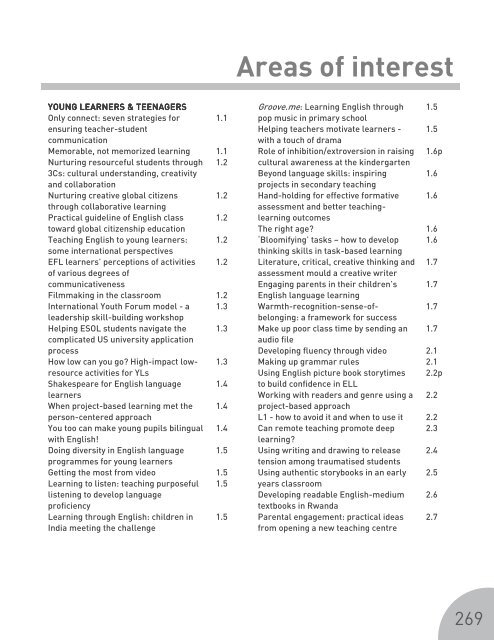Create successful ePaper yourself
Turn your PDF publications into a flip-book with our unique Google optimized e-Paper software.
Areas of interest<br />
YOUNG LEARNERS & TEENAGERS<br />
Only connect: seven strategies for<br />
ensuring teacher-student<br />
communication<br />
Memorable, not memorized learning<br />
Nurturing resourceful students through<br />
3Cs: cultural understanding, creativity<br />
and collaboration<br />
Nurturing creative global citizens<br />
through collaborative learning<br />
Practical guideline of English class<br />
toward global citizenship education<br />
Teaching English to young learners:<br />
some international perspectives<br />
EFL learners’ perceptions of activities<br />
of various degrees of<br />
communicativeness<br />
Filmmaking in the classroom<br />
International Youth Forum model - a<br />
leadership skill-building workshop<br />
Helping ESOL students navigate the<br />
complicated US university application<br />
process<br />
How low can you go? High-impact lowresource<br />
activities for YLs<br />
Shakespeare for English language<br />
learners<br />
When project-based learning met the<br />
person-centered approach<br />
You too can make young pupils bilingual<br />
with English!<br />
Doing diversity in English language<br />
programmes for young learners<br />
Getting the most from video<br />
Learning to listen: teaching purposeful<br />
listening to develop language<br />
proficiency<br />
Learning through English: children in<br />
India meeting the challenge<br />
1.1<br />
1.1<br />
1.2<br />
1.2<br />
1.2<br />
1.2<br />
1.2<br />
1.2<br />
1.3<br />
1.3<br />
1.3<br />
1.4<br />
1.4<br />
1.4<br />
1.5<br />
1.5<br />
1.5<br />
1.5<br />
Groove.me: Learning English through<br />
pop music in primary school<br />
Helping teachers motivate learners -<br />
with a touch of drama<br />
Role of inhibition/extroversion in raising<br />
cultural awareness at the kindergarten<br />
Beyond language skills: inspiring<br />
projects in secondary teaching<br />
Hand-holding for effective formative<br />
assessment and better teachinglearning<br />
outcomes<br />
The right age?<br />
‘Bloomifying’ tasks – how to develop<br />
thinking skills in task-based learning<br />
Literature, critical, creative thinking and<br />
assessment mould a creative writer<br />
Engaging parents in their children’s<br />
English language learning<br />
Warmth-recognition-sense-ofbelonging:<br />
a framework for success<br />
Make up poor class time by sending an<br />
audio file<br />
Developing fluency through video<br />
Making up grammar rules<br />
Using English picture book storytimes<br />
to build confidence in ELL<br />
Working with readers and genre using a<br />
project-based approach<br />
L1 - how to avoid it and when to use it<br />
Can remote teaching promote deep<br />
learning?<br />
Using writing and drawing to release<br />
tension among traumatised students<br />
Using authentic storybooks in an early<br />
years classroom<br />
Developing readable English-medium<br />
textbooks in Rwanda<br />
Parental engagement: practical ideas<br />
from opening a new teaching centre<br />
1.5<br />
1.5<br />
1.6p<br />
1.6<br />
1.6<br />
1.6<br />
1.6<br />
1.7<br />
1.7<br />
1.7<br />
1.7<br />
2.1<br />
2.1<br />
2.2p<br />
2.2<br />
2.2<br />
2.3<br />
2.4<br />
2.5<br />
2.6<br />
2.7<br />
269


